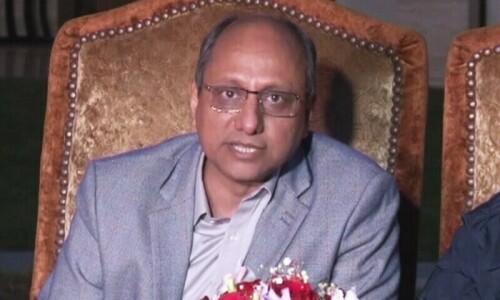Chief Election Commissioner Sikandar Sultan Raja on Tuesday asked the Punjab government to enact legislation for holding local government elections in the province within a week or proceed with conducting polls under the existing laws.
The CEC made these remarks during a hearing after the Election Commission of Pakistan (ECP) took notice of a delay in LG polls in Punjab.
On Oct 7, the ECP taken notice of the delay in Punjab LG polls and summoned the Punjab chief secretary and provincial local government secretary to appear before the ECP bench on Oct 18 (today).
During the hearing, Raja warned the provincial administration of contempt action if it failed to comply with the commission’s directives.
The CEC also observed that the provincial government was violating the Supreme Court orders by delaying the LG elections.
Also read: SC orders restoration of LG institutions in Punjab
He said that the ECP was also sending a reference to the Supreme Court today to convey concerns that the Punjab government was not holding LG elections.
“We will not hold talks with the provincial government anymore and now make a decision,” he said during the hearing.
Raja lamented there was no LG government in Punjab for the past 10 months.
Electronic voting machines
Commenting on the PTI’s demand to employ electronic voting machines for elections across the country, the CEC said the number of polling stations in the LG elections greater than other elections.
“Should we now get into the EVM debate? Will anyone take responsibility if the election process faces some problems?” he asked.
Citing a study, he said that elections would become questionable if the EVMs were put to use in haste. “We cannot afford to launch EVMs on whims and cause anarchy in the country,” he said, adding the Punjab government wanted anarchy to spread in the country.
Raja said only two countries — Brazil and India — were using EVMs.
The Punjab Chief Secretary told the meeting that the Punjab Assembly session was underway and the legislation for LG elections will be enacted in it.
“Only a debate on the EVMs is taking place,” he added.
Speaking on the occasion, the special secretary of the ECP, said the electoral watchdog issued a schedule for by-polls in Punjab on April 14, 2022, however, the Lahore High Court issued a stay on it two weeks later.
He said the Punjab government had dissolved the local government institutions in April 2019, and after the order of the Supreme Court, they were restored, whose term also expired on Dec 31, 2021.
In the meantime, he noted, the provincial government kept amending the laws from time to time, due to which it was not possible to hold elections.
Under Article 140-A of the Constitution and Section 219(4) of the Elections Act, the Election Commission of Pakistan is bound to hold elections within 120 days of the expiry of the term of the local government institutions.
He said the ECP conducted delimitations twice which incurred expenses. He urged the participants to take measures for collecting the expenses from the provincial government, while warning of contempt action against it.















































